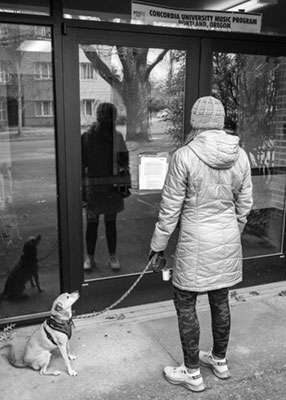By Nancy Varekamp | CNews Editor

staff has dwindled — since classes ended last spring. Pedestrians, dog walkers and other neighbors who read posted copies of the Trustee’s Notice of Sale wonder who the new owner will be. Photo by Chris Baker
Trustee Lawyers Title Insurance Corporation initiated foreclosure proceedings against Concordia University Jan. 27 for defaulted loans. It came 13 days short of a year after the school announced it would close its doors.
News of the foreclosure spread quickly after certified copies of an 11-page Trustee’s Notice of Sale were posted on the campus by the trustee.
According to the notice, if CU does not repay the loans upon which it has defaulted, a sale of the properties and facilities is scheduled for 1 p.m. June 29.
“In a foreclosure, if the borrower cures the defaults and pays the amounts due, the lender will cancel the foreclosure sale,” explained the trustee’s attorney Teresa Pearson.
Many of the questions CNews asked weren’t answered. Among those unanswered are: May someone pay the in excess of $37 million named in the Trustee’s Notice of Sale and preclude the June 29 sale? Will the four distinct areas named in the notice of sale be sold separately, or as one piece? Do those four areas comprise the entire campus, or only the majority of CU’s property?
However, there is an answer to one question many neighbors ask, and that’s to what uses a new owner is allowed to put the 24-acre campus.
Quite simply, that depends on what the new owner wants — and what the city allows.
Currently zoned Campus Institutional (CI1), colleges and medical centers – and a few other accessory uses – are allowed. That’s according to Eric Engstrom, principal planner for the Portland Bureau of Planning & Sustainability.
He added, “A fundamental question, of course, is if the site is purchased by another educational institution who would use it in a similar way as Concordia, or if a new owner had an entirely different vision in mind.
“The current zoning does not allow general commercial uses or housing (other than student or employee housing associated with a campus institution),” he wrote in an email. Continuing as a CI1, any major additions of new facilities would trigger a transportation impact review, he added. And that would involve community input.
If a new owner wants to change or modify the zoning, there are two options. Both require opportunities for public input, and the city council makes the decision, the planner pointed out.
“In both cases, considerations would include traffic, infrastructure adequacy and consistency with the city’s overall planning goals,” he explained. “Some of those goals touch on things like community character and public involvement.”
Editor’s note: The story doesn’t stop here. There are already a few details known that don’t fit this CNews space. Visit ConcordiaPDX.org/OtherCUIssues. And more details are expected to be revealed in coming weeks and months, so stay tuned to CNews, ConcordiaPDX.org and Facebook.com/groups/ConcordiaPDX.
Nancy Varekamp is semiretired from her career in journalism, public relations and – her favorite work engagement – writing and editing targeted newsletters.